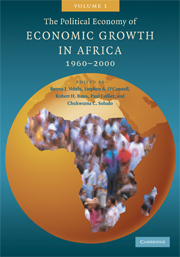Book contents
- Frontmatter
- Contents
- List of figures
- List of tables
- List of contributors
- Foreword
- List of acronyms
- PART 1 OVERVIEW
- PART 2 INTERPRETATION
- PART 3 EXPLANATION
- 9 The evolution of global development paradigms and their influence on African economic growth
- 10 Political reform
- 11 Endogenizing syndromes
- PART 4 LOOKING AHEAD
- Index
- References
11 - Endogenizing syndromes
Published online by Cambridge University Press: 09 January 2010
- Frontmatter
- Contents
- List of figures
- List of tables
- List of contributors
- Foreword
- List of acronyms
- PART 1 OVERVIEW
- PART 2 INTERPRETATION
- PART 3 EXPLANATION
- 9 The evolution of global development paradigms and their influence on African economic growth
- 10 Political reform
- 11 Endogenizing syndromes
- PART 4 LOOKING AHEAD
- Index
- References
Summary
Introduction
We have seen that Africa's geography has distinctively shaped its opportunities. Two-thirds of Africa's population live in countries that are either dominated by natural resource wealth, or are landlocked and resource-scarce. Both of these conditions are difficult to cope with, and both are far more common in Africa than in other parts of the developing world. In this chapter we suggest that not only have Africa's opportunities been shaped by its geography, but that to a significant extent so have its choices.
Policy choices do not lend themselves to quantitative analysis: they are highly multifaceted with no obvious procedure for aggregation, and they are often continuous but ordinal, lying on the qualitative spectrum better–worse. In addition, individual variables often measure policy outcomes rather than policy settings: they become endogenous to growth. We have reduced this complexity to a manageable set of “syndromes” – patterns of policy choice that are plausibly causally prior to growth outcomes and that an economist would expect to be seriously dysfunctional for growth. This simplification has naturally come at the price of a substantial loss of information. However, as we saw in chapter 2, the syndromes are associated with a substantial part of Africa's growth shortfall. If this association is causal, which we shall investigate, then the loss of information is not overly severe, at least in terms of the impact of policies on growth. Attention then properly shifts to explaining policy choices, and here the syndrome structure provides a powerful focal point for analysis.
- Type
- Chapter
- Information
- The Political Economy of Economic Growth in Africa, 1960–2000 , pp. 391 - 418Publisher: Cambridge University PressPrint publication year: 2007
References
- 4
- Cited by



